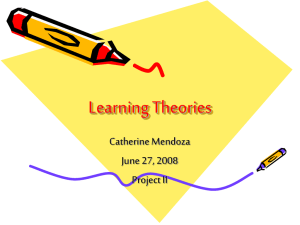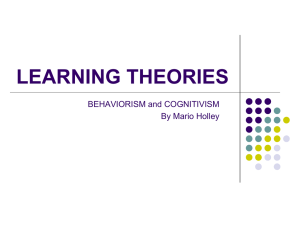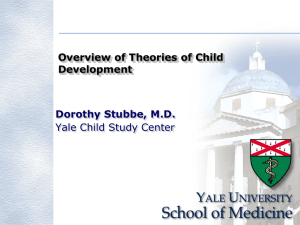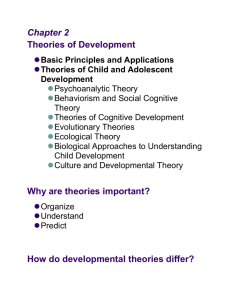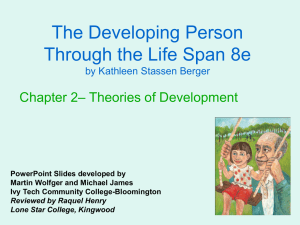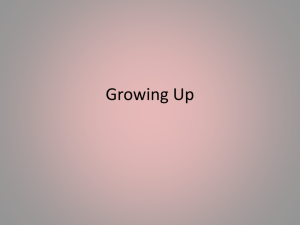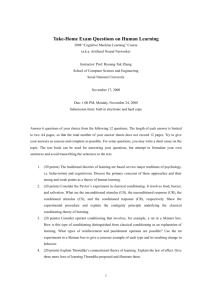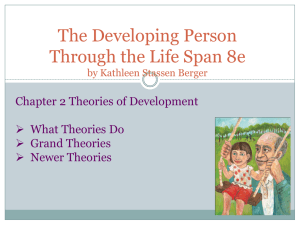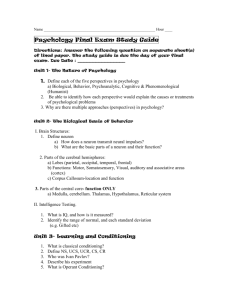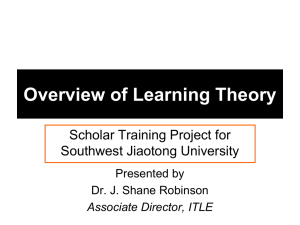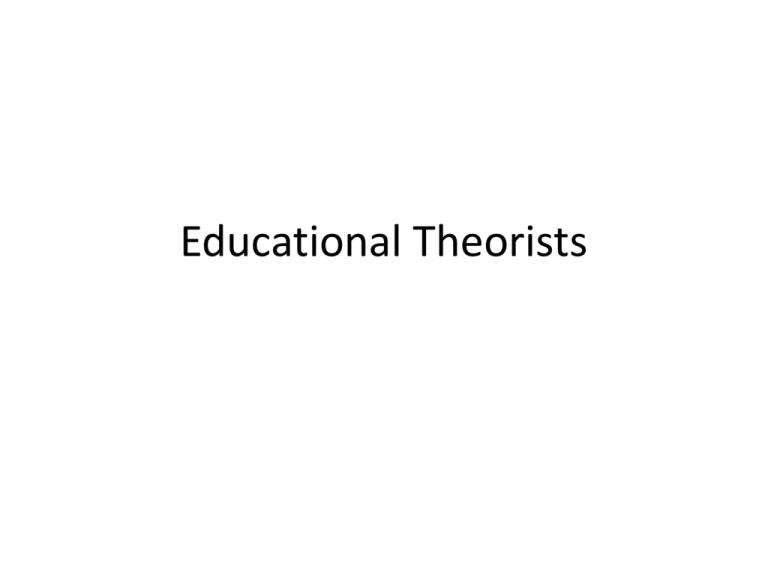
Educational Theorists
What is a Theory?
• Theories are used for building a better
understanding of the teaching and learning
process.
• Theory = guess or hunch
• Scientific Theory=interrelated set of concepts
that are used to explain a body of data and to
make predictions about the results of future
experiments.
What is a Theory
• Fact or Fiction?
– Principles will give you help
– Theories will give you options
Theory 1
https://www.youtube.com/watch?v=V3GJycgucs
Theory 2
• https://www.youtube.com/watch?v=5IJXsUBd
l0g
Stage Theorists
• Jean Piaget 1896-1980
– Famous For: described 4 different stages of
cognitive development
– Implication on education: claims one cannot
master one level before completing the previous.
Piaget’s Stage Theory
Age
Period
Characteristics
0-2
Sensori-motor
Infants learns to differentiate between itself and
other objects within its environment, learning the
difference between ‘me’ and ‘not me’.
2-4
Pre-operational thought
The child is still very egocentric, but now classifies
objects in simple ways – particularly by individual
important features.
4-7
Intuitive
The child now classifies things more generally,
but is not aware of the classes that he or she
uses.
7-11
Concrete operations
Here, the child can use logical operations, such as
reversal, deliberate classifications and
serialization.
11-15
Formal Operations
Now things become more conceptual as the child
is able to think in terms of abstract ideas.
Stage Theorists
• Sigmund Freud 1856-1939
– Famous For: 5-stages of psychosexual
development
– Implication on education: believes if one stage is
not mastered growth will stop.
Freud’s Psychosexual Theory
Age
Name
Pleasure Source
Conflict
0-2
Oral
Mouth: sucking, biting, swallowing
Weaning away from
mother’s breast
2-4
Anal
Anus: defecating or retaining feces
Toilet training
4-5
Phallic
Genitals
Males seek out
parent of opposite
sex to feel
substantiated.
6-Puberty
Latency Sexual urges sublimated into sports
and hobbies. Same-sex friends also
help avoid sexual feelings
Puberty onward
Genital
Physical sexual changes reawaken
repressed needs. Direct sexual
feelings towards others lead to
sexual gratification
Social Rules
Stage Theorists
• Erik Erikson 1902 -1994
– Famous For: Developed Psychosocial Theory,
stages where individuals are faced with choices
and must resolve the crisis to successfully move
on to the next.
– Implications for Education: explanation for
individuals success and failures throughout life.
Erikson’s Developmental Stage Theory
Level
Name
Characteristic
Stage 1
Trust vs. Mistrust
(infant)
A child will only learn trust if its mother meets the child’s deep need for
attention and affection.
Stage 2
Autonomy vs.
Shame and Doubt
(age 3)
If the exploring child receives encouragement in a search for autonomy,
the child will learn trust, otherwise they learn shame and doubt.
Stage 3
Initiative vs. Guilt
(age 4)
If the questioning child is encouraged in their ideas and games, the child
will gain confidence or otherwise feel guilty about initiating things.
Stage 4
Industry vs.
Authority (at school)
If encouraged and praised by teachers, the child will increase efforts to
learn. If always criticized, the child will learn to feel inferior.
Stage 5
Identity vs. role
confusion (age 12)
If the child’s identity has been reinforced up to puberty, the child will
handle it well. If not, there is a frightening identity crisis.
Stage 6
Intimacy vs.
Isolation (middle
age)
Identity crises may occur later in life if people cannot or do not relate to
others.
Learning & Motivation Theories
• Behaviorism
• Information Processing
• Social Cognitive Theory
Learning and Motivation Theories
Behaviorism:
• Focuses on things that can be observed, classified into a general
category.
• Influenced by 2 environmental factors:
– Those that precede it (antecedents) and those that follow it
(consequences).
– A-B-C Model: Antecedent-Behavior-Consequence
• Important Concepts
– Conditioning, reinforcement, punishment and cueing.
• Who is involved:
– B.F. Skinner
• Implications for Education:
– learn through our actions and consequences, operant conditioning
• Operant Conditioning
• http://youtu.be/qy_mIEnnlF4
Learning & Motivation Theories
Information Processing
• Theories that focus on attention, types of
memory, how knowledge is represented and
stored, forgetting, and the cognitive systems.
• Important Concepts:
– Attention, perception, working memory, long-term
memory, and types of knowledge.
• Who is involved:
– Jean Piaget
• Implications for Education:
– Identifies our ability to store and recall knowledge.
Learning & Motivation Theories
Social Cognitive Theory
• Combines behavioral concerns with consequences and
cognitive interests in thinking.
• Important Concepts:
– Interactions among behavior, environment, and personal
characteristics; beliefs about personal capabilities; learning
through observation and modes; and guiding your own learning
through self-regulation.
• Who is Involved:
– Albert Bandura
• Implications for Education:
– Addresses our motivations for specific behaviors, why we make
certain decisions
Behaviorism: Classical Conditioning
• Association of automatic responses with new
stimuli.
• Little Albert:
http://www.youtube.com/watch?v=Xt0ucxOrP
QE
• Recreate a scenario with your group to
demonstrate how classical conditioning works.
Behaviorism: Operant Conditioning
• Learning in which voluntary behavior is
strengthened or weakened by antecedents
(before) or consequences (after).
• Pavlovs Dog:
http://www.youtube.com/watch?v=8OLdb9Vh10
E
• Recreate a scenario with your group to
demonstrate how operant conditioning works.
Information Processing
Information Processing: Sensory
Memory
• Sensory Memory: system that holds sensory
information very briefly.
• Draw the picture from the previous slide.
Information Processing: Working
Memory
• The information that you are focusing on at a
given moment.
• Each student needs to stand up and state their
name. Once everyone is finished record them
in the order they were said.
Social Cognitive Theory: Self-Efficacy
• A person’s sense of being able to deal
effectively with a particular task. Beliefs about
personal competence in a particular situation.
• On your note paper, identify one thing you
feel you do very well and one thing you feel
you are not able to do from experience.
Social Cognitive Theory: SelfRegulation
• Process of activating and sustaining thoughts,
behaviors, and emotions in order to reach
goals.
• Record your answers to the questions on the
next page.
Self-Regulation Quiz
• Think about the class you are taking right now. On a 7-point
scale – from 1 = not at all true of me, to 7 = very true of me
– answer the following questions.
1. When I study for a test, I try to put together the
information from class and from the book.
2. When I do homework, I try to remember what the teacher
said in class so I can answer the questions correctly.
3. I know I will be able to learn the material for this class.
4. I expect to do well in this class.
5. I ask myself questions to make sure I know the material I
have been studying.
6. Even when study materials are dull and uninteresting, I
keep working until I finish.

